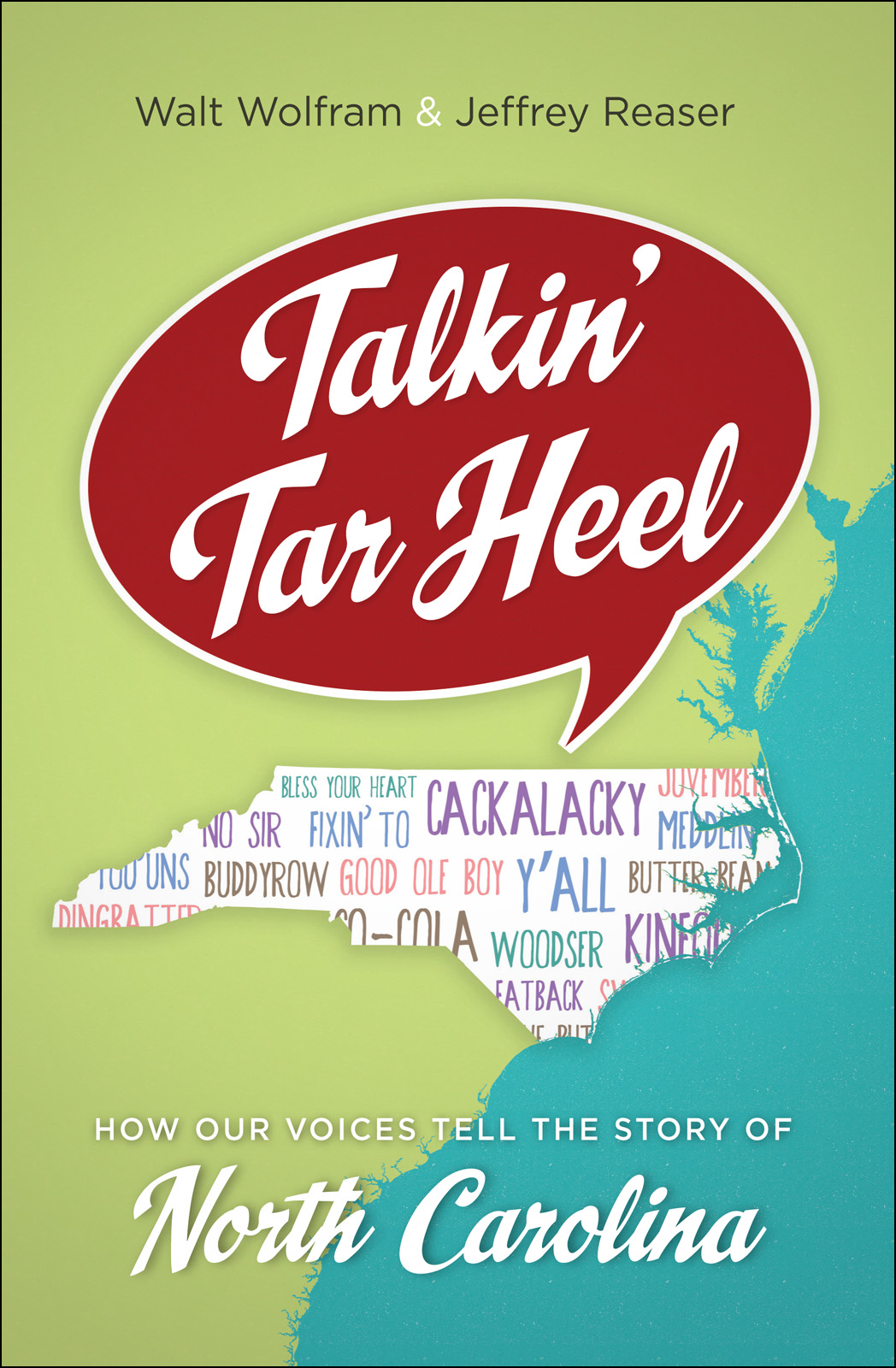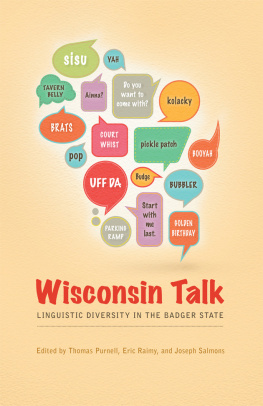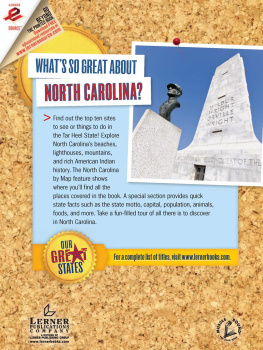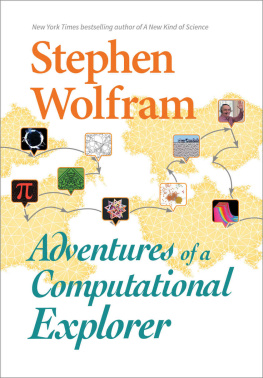
Contents
Talkin Tar Heel
This book was published with the assistance of the Blythe Family Fund of the University of North Carolina Press.
2014 The University of North Carolina Press
All rights reserved. Manufactured in the United States of America.
Designed and set in Quadraat types by Sally Scruggs. The paper in this book meets the guidelines for permanence and durability of the Committee on Production Guidelines for Book Longevity of the Council on Library Resources. The University of North Carolina Press has been a member of the Green Press Initiative since 2003.
Library of Congress Cataloging-in-Publication Data
Wolfram, Walt, 1941
Talkin tar heel : how our voices tell the story of North Carolina /
Walt Wolfram, Jeffrey Reaser.
pages cm
The book is enhanced by maps and illustrations and augmented by more than 100 audio and video recordings, which can be found online at talkintarheel.com.
Includes bibliographical references and index.
ISBN 978-1-4696-1436-6 (hardback) ISBN 978-1-4696-1437-3 (ebook)
1. English languageDialectsNorth Carolina. 2. English languageDialectsNorth CarolinaElectronic information resources. 3. English languageNorth Carolina. 4. AmericanismsNorth Carolina. 5. North CarolinaLanguages. I. Reaser, Jeffrey Leo, 1976II. Title.
PE3101.N76W65 2014
427.9756dc23
2013041124
18 17 16 15 14 5 4 3 2 1
Contents
Preface
Linguists usually write books about particular languages or dialects, not about language diversity within a political state. But there are also few states that showcase regional, ethnic, and social diversity of language more stylishly than the Tar Heel State. In many respects, North Carolina is a microcosm of the vast range of language differences that have developed over time and space in the United States. After more than two decades of interviewing and recording thousands of residents and shooting hundreds of hours of video footage, we feel that we would be remiss if we did not share the rich assortment of North Carolina voices with a broader audience.
Under the rubric of the North Carolina Language and Life Project (NCLLP), we have undertaken the challenge of describing the dialects and languages of North Carolina. The NCLLP is a unique, language-based program at North Carolina State University that focuses on research and outreach programs related to language in North Carolina. Its goals are: (1) to gather basic research information about language varieties in order to understand the nature of language variation and change; (2) to document language varieties in North Carolina and beyond as they reflect the varied cultural traditions of their residents; (3) to provide information about language differences for public and educational interests; and (4) to use research material for the improvement of educational programs about language and culture.
Since the NCLLPs inception in 1993, its staff has been conducting sociolinguistic interviews with residents in North Carolina that connect language, culture, and history. Discussions typically cover a wide range of topics, from history and remembrances to current livelihood and lifestyle changes. All of the interviews are archived on a website hosted by the library at North Carolina State University, the Sociolinguistic Archive and Analysis Project (http://ncslaap.lib.ncsu.edu). This interactive, Web-based archive of sociolinguistic recordings integrates with annotation features and technical analysis tools. It is an ongoing, constantly growing archive that contains (as of September 2013) over 6,000 audio files, 3,200 hours of audio, 100 hours of transcribed audio, and more than 1 million words accurately linked to the audio. We are serious about preserving the voices of Tar Heel speech in the digital age.
The NCLLP is a major research program, but it is more than that. Following the adage if knowledge is worth having, then it is worth sharing, we have been engaged in a number of community-based language and dialect projects that focus on regional, social, and ethnic varieties of southern English, attempting to represent the major dialect areas of North Carolina as well as the urban-rural dimension of dialect patterning. Extensive, community-based studies have taken place in more than twenty-five different community sites spanning literally from Murphy to Manteo. We initially focused on more remote, rural areas, but our colleagues have more recently undertaken studies of urban areas so that we can understand the current rapidly expanding metropolitan context of North Carolina. We have studied ethnic and social dimensions of language differences that include African American varieties of English, American Indian languages and varieties of American Indian English, and emerging ethnic varieties of English spoken by Latinos in rural and metropolitan areas.
In addition to its sociolinguistic research commitment, the NCLLP engages in a full array of public-outreach programs related to language diversity. These activities have led to the production of a series of television documentaries that range from a general profile of language variation throughout North Carolina (Voices of North Carolina, 2005) to documentaries on particular dialects, such as Outer Banks English (The Ocracoke Brogue, 1996; The Carolina Brogue, 2009), Southern Highland speech in western North Carolina (Mountain Talk, 2004), Lumbee English (Indian by Birth: The Lumbee Dialect, 2001), and languages (Spanish Voices, 2011), with more in progress. The staff of the NCLLP has further produced a number of oral history CD collections and published trade books on particular varieties of English, such as Lumbee English and Outer Banks English. They have also constructed exhibits on dialects at museums and cultural centers in partnership with local communities as well as at the State Fair in Raleigh. A dialect-awareness curriculum for middle school students has been developed throughout the state (Voices of North Carolina: From the Atlantic to Appalachia, 2007), and staff members routinely give presentations and conduct workshops on language diversity in the public schools and at local civic organizations, including preservation and historical societies.
The simple goal of this book is to share knowledge and respect for the heritage of languages and dialects in North Carolina in a readable, audible, and visual format accessible to the general reader. We try to avoid linguistic jargon, but when it is necessary to use technical terms, we define them in a way that our nonlinguist friends and family can understand. We also employ a convention used in our field where dialect words and structures are written in italics to separate them from the rest of the sentence. Most of the time, these are followed immediately by definitions or translations, which appear in parentheses and quotation marks to keep them separate. We also include more than 125 audio and video enhancements from our rich archive of audio and video footage as well as other resources to allow the voices and people to speak for themselves. Though the extensive integration of audio and visual enhancements throughout the text is somewhat novel in the field of linguistics, the inclusion of the clips seems as natural as language diversity itself. We want the general reader to experience language and dialect rather than imagine it, and experiencing the enhancements is easy. Each enhancement has a brief description so that the reader knows what he or she might hear or see. All the reader has to do is navigate any Web browser to the provided URL or use a smartphone or any device with a QR reader to snap a picture of the QR code to access the media directly. In the enhanced e-reader version of the book, these enhancements are embedded in the text itself.
Next page






